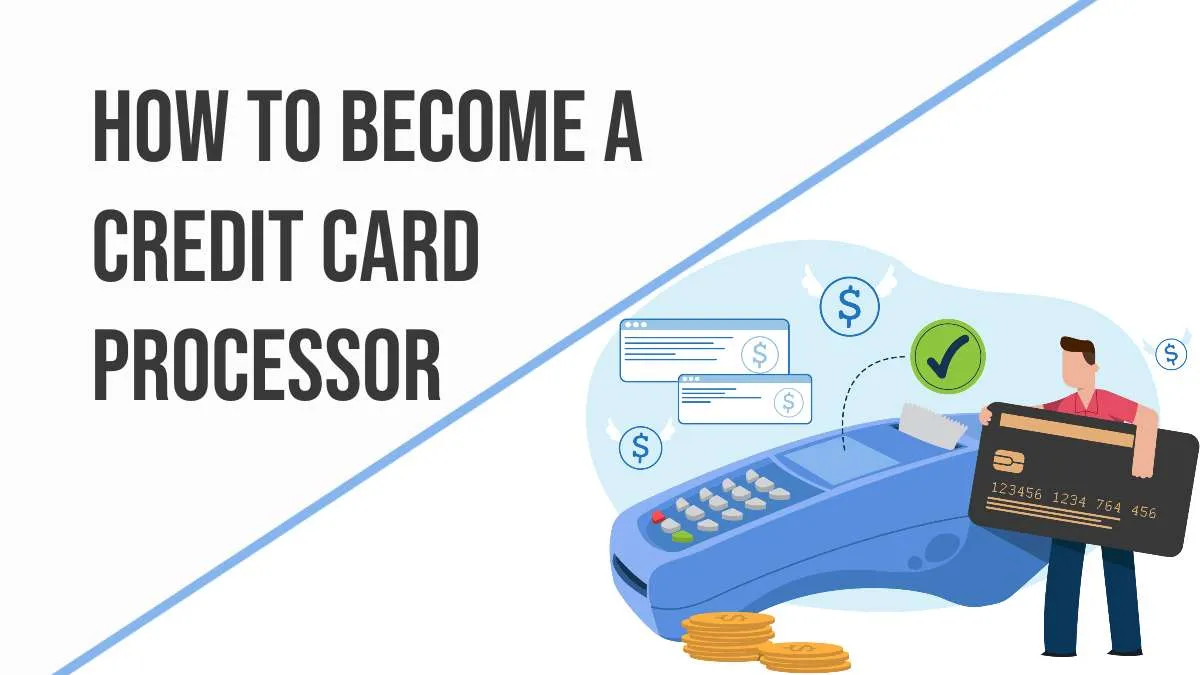
Running a company may be difficult no matter what services or goods you provide. Accepting credit cards as a credit card merchant will provide you with the freedom you need to close every conceivable sale.
You want to prevent situations when a consumer or client wants to purchase your goods, but you don’t take credit cards because you don’t accept them.
This would not be a problem if you were a credit card merchant. You’d only notice the many advantages to your business line that taking plastic brings.
Also, you can able to know,
What is a Credit Card Processor
In the context of credit card processing, this refers to the multi-step procedure that must be followed to finalize payments made by credit cards correctly. The digital era allows transactions to occur almost everywhere – in person, online, over the phone, or via the mail.
A large number of businesses are involved in credit card processing. Consumers, merchants, payment gateways, credit card processors, card networks, issuing banks, and acquiring banks are all included in this category.
How Does Credit Card Processing Work
A consumer must first give their credit card details to make a payment. In stores, customers swipe magnetic stripe cards, dip EMV chip cards, tap contactless cards, and use digital wallets such as Apple Pay to make purchases.
Consumers use payment gateways to present credit and debit cards on websites and applications. A virtual terminal provides safe credit card processing using a personal computer for phone orders.
The payment information is subsequently given to the processor, who uses the relevant card networks to interact with the customer’s bank (such as Visa or Mastercard).
Also, the transaction is approved or denied by the customer’s bank. Approval is contingent on comprehensive verification, which includes the legitimacy of the card number, the availability of adequate cash, and other conditions.
That approval is sent to your payment processor, who then passes it on to your terminal or credit card reader. After each working day, approved transactions are batched for settlement.
The transactions are debited to your customer’s accounts, and deposits are made into your merchant bank account.
Who is Involved in Credit Card Processing
The following organizations are essential to the operation of credit card processing, which allows for the safe capturing of payments at the point of sale (POS).
Consumer: The individual who possesses the card or makes the transaction.
Merchant: The individual or corporation sells the goods or services the customer is buying.
Payment gateway: The technology that establishes a connection between a merchant and a payment processor An integration point for both card-present (e.g., in-store purchases) and card-not-present (e.g., online or eCommerce) payment environments.
A gateway captures payment details for customer transactions routes them to a payment processor or the merchant bank.
And sends a message to the merchant indicating whether the transaction has been approved or declined.
Credit card processor: Also introduced as a “payment processor” in a broader sense. The organization that allows communication between a merchant, a credit card network, and the cardholder’s bank is a payment gateway.
It is the responsibility of processors and merchants to ensure that they comply with the Payment Card Industry Data Security Standards (PCI DSS).
Others, often the bigger processors, have reseller relationships with payment gateways, while others, mainly the smaller processors, do not have payment gateways of their own.
Card Network: Credit card networks and brands are also referred to as the “credit card network” and the “credit card brand.”
Customer credit cards are identified by their brand, American Express, Visa, Mastercard, or Discover.
In addition to determining interchange and assessment fees, the credit card networks also establish PCI DSS requirements and standards.
Issuing bank: The “cardholder’s bank” or “consumer bank” are other names for this institution. Essentially, this is the financial institution that issues the customer’s credit card.
One of the most important duties performed by the issuing bank throughout the credit card processing cycle is to evaluate if the cardholder’s account has sufficient money to complete the transaction and, if so, to release those funds for settlement.
Acquiring bank: The “commercial bank” is another term for this institution. This is the bank that the merchant uses to keep their business finances and receive money from transactions, as indicated by the name.
It may give the merchant card readers and other equipment to accept credit and debit card payments. In certain circumstances, the acquiring bank might also act as a credit card processor.
Steps You Need to Take to Become a Successful Credit Card Processing Agent
Are you interested in learning how to become a credit card processing agent? You’ve come to the correct location! Owners of small businesses come in a variety of forms and sizes.
Some are little businesses looking to earn a little more money each month, while others are giant corporations expecting to take over the corporate world in a few years. There is a slew of others in between.
Read more: How to Become a Graphic Designer Without a Degree
Pick a Niche
Starting a credit card processing business without a specialization is a bad idea. Understanding your client’s company environment and providing a solution based on their specific scenario is essential for landing clients.
Consider yourself a merchant services consultant who assists with the transferor beginning of a merchant account. You must attend to your client’s needs, and newcomers are frequently distrusted.
So, how do you go about picking a niche? Begin by considering your previous experience and location. Do you have ten years of restaurant experience and reside just outside of Chicago?
Perfect. Food services should be at the center of your business, and you should use that expertise. Have you obtained a legal degree but realized it is not for you?
Especially, please make use of it to your advantage. If you don’t know what sector you want to work in, go around your neighborhood to see what firms are doing well.
Do you have a lot of B2B tech businesses that are relocating and developing in your area? What about golf courses? Healthcare? Clothing from a boutique?
The beauty of merchant services is that anybody can accept payments, so check around to find where your skills and the market meet.
Expert in Credit Card Processing
If you are new to merchant services, learn about how transactions are conducted, the connection between issuing and acquiring institutions, and standard technology.
If you aren’t aware of Elon Musk’s method of learning new subjects through a semantic tree, you should be. It’s essential to comprehend your position in the merchant services ecosystem after learning about the industry’s origins, current state, and future.
In summary, you will act as a liaison between a merchant and a merchant services provider OR as an “independent sales organization” supplier. You and your ISO will acquire “wholesale” merchant processing rates and resell them to companies as a reseller.
Your objective is to convince the merchant to switch providers and aid with the account setup (assist with paperwork, applications, etc.).
Let’s assume your agreed purchase rate is 1.79 percent + $0.20 for each transaction, but you pitch your customers 2.25 percent + $0.25 – that’s 0.46 percent + $0.05 for every sale.
That’s yours! That’s what you’ll get forever, presuming the firm doesn’t switch providers or shut. That figure may pile up fast. Your residuals would be $70.25/month if your merchant handled $15,000/month over 25 transactions.
You may make over $8,000 per year if you land 10 of them. Your residuals will rise as these firms expand.
After you understand the environment, it’s time to tailor the services, MSPs, and their offers to your niche.
To fully equip your customers, you need to know the best solutions for your sector and have partnerships with the correct ISOs and MSPs.
Compare ISO/MSP Programs
There are several ISO/MSP programs out there, and they all handle partnerships with merchants and merchant services agents differently. Don’t slack off on this one.
Consider these factors while comparing sales programs:
# Verify their expertise in your field.
# Is their community active? Are they clear, mission-driven, and reputable? How do they treat their customers? Remember that you will be working with them for years to come.
# Avail of the newest items Also consider software.
# Are they clear? Clear? You’ll need to be confident while defending your MSP to the retailers you’re aiding.
# Examine their partner program. Was the buy/sell rate? Who controls your residuals? What resources do they provide? Know what you’re getting into.
# Avoid MSPs that demand startup fees and impose monthly minimums.
# Who represents them? Call them and check whether you like/admire them. You’ll be pulling your merchants into that culture, so assess them from both a partner and customer standpoint.
Fill out an Application for the Program of your dreams (s)
So you’re an expert in your field, you’re well-versed in the world of merchant services, and you’ve located the ideal MSP. Great! Try it out and see what happens. You should be OK if you did your homework correctly and fit into their purpose and aims.
Read more: How to Become a Computer Programmer Without a Degree
Gather and Arrange your Company’s Assets.
It’s easy to go out there and start knocking on doors simply, but you need to have the financial resources to back up what you’re selling.
Many of these sales materials will be provided by a competent MSP program, but there are a few you’ll need to have on hand:
# White papers are a kind of paper that is used
# Flyers
# Pamphlets
# Website for personal use
# Profiles on social media
# Business cards
# Are used to promote a company
# Procedures for account documentation
Begin Selling
There’s nothing more for you to do at this stage in your credit card processing company except go out there and start signing merchants! Always keep in mind that firms won’t listen to you unless you’re making a really solid business choice.
If you’re promoting a greater transaction rate, you’ll need talking points to back up your claim (better customer service, less downtime, more payment options, etc.).
If you’re proposing a reduced rate, you can start with that, but you’ll need to sell around it to make it seem like partnering with you is helping them develop their company.
Put yourself in your customers’ position and strive to assist them, this is how you succeed in sales.
Job Outlook & Salary
The US Bureau of Labor Statistics projects a 16% increase in employment for wholesale and manufacturing sales agents, including credit card machine sales assistants, by 2020, compared to a 14% increase for all jobs.
The quantity of sales positions accessible is directly proportional to the status of the economy. Also, if the economy continues to improve, credit card machine salespeople may have additional work options. Retailers may replace obsolete credit card terminals and systems at a larger profit margin.
Indeed, the typical pay for credit card machine salespeople differed significantly among the four US regions in 2013. They earned the highest wages of $70,000 in Illinois and the lowest earnings of $56,000 in Nebraska and South Dakota in the Midwest.
In Maine and New York, those in the Northeast earned $56,000 to $78,000 a year, respectively. In Hawaii and California, these sales professionals earned $44,000 to $71,000, respectively, the lowest and highest earnings in the West. Credit card processors earned the most in Washington, DC, and the least in Louisiana in the South area, with $77,000 and $55,000, respectively.
Read more: The Best Email Marketing Tips
Conclusion
As a company owner, you may feel as if you’ve been inundated with technical knowledge.
However, if you take credit and debit card payments, you must have a fundamental grasp of credit card processing and how it operates. And also, especially getting to know how to become an investor is worth it for your future career.
Indeed, this may help you streamline your payment processing to save time and money while increasing your company’s productivity. Understanding each phase and who is involved is beneficial.
As a result, you’ll better understand the many parts of the process and how they affect your company and consumers.












